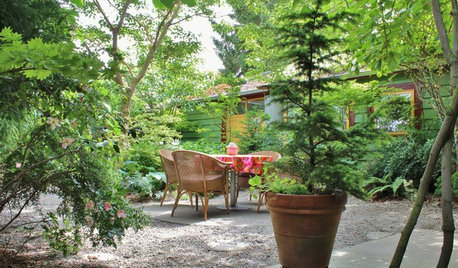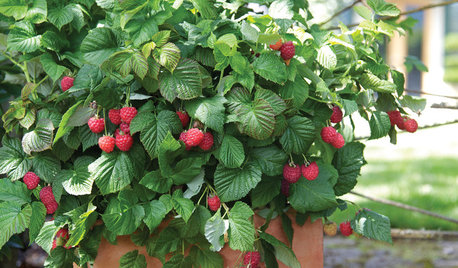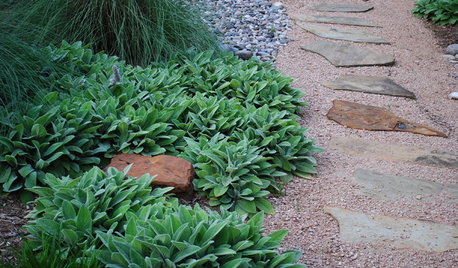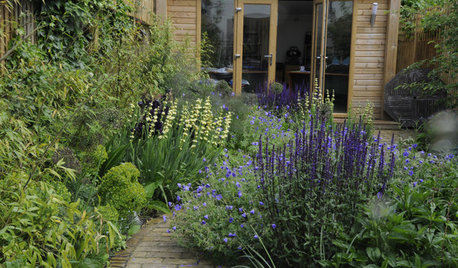Organic matter even needed if soil composition is perfect? No worms...
barplants123 barplants123
4 years ago
last modified: 4 years ago
Featured Answer
Comments (17)
toxcrusadr
4 years agogardengal48 (PNW Z8/9)
4 years agoRelated Discussions
Increasing Soil Organic Matter
Comments (26)Regarding sustainment: I have mentioned this many times on this forum, but I know several people who raise cattle with nearly zero inputs. Calcium is an input and a few other minerals that the cattle remove from the soil, but that's all. These ranchers use no seed, fertilizer, herbicide, insecticide, miticide, dewormers, hormones, antibiotics, or anything else. They don't even irrigate. They just add water troughs and the minerals (calcium and seaweed) and that's all. They have no trouble raising fat cattle on the grass that grows in Central Texas (not known for lots of rainfall). Because they have stopped using the -icides, their land has improved markedly and continues to improve as they increase their stocking rate. These guys carry twice as many "animal units" per acre as their neighbors because they have so much healthy, natural (native) grass. Meanwhile their neighbors are buying the latest and greatest seed every year, which of course requires you to tune up your fertilizer regimen and get rid of the weeds. They also deworm their cattle which kills the dung beetles which bury the dung down in the soil where they, and other creatures, decompose it adding fertility right where Nature intended for it to be. The "organic" guys have tall grass from fenceline to fenceline while the neighbors have scrub, rocks, washouts, and very little cash at the end of the year. This is not only sustainable (except for the calcium an seaweed) but extraordinarily profitable since the inputs are so small and the stocking rate is double. And I hear people all the time saying they're lying about this or that because you can't do it that way, but they do. If you go back to a system more like what Mother Nature developed, you can sustain the system and still profit from it. But in our arrogance we have to tinker with things, and it seems we are trying to tinker ourselves out of resources....See MoreCan you mix organic matter directly into the soil?
Comments (19)ok, this is kinda sorta related, but it might be more appropriate in the pests forum, but I'd like to pick the soil experts brains first. I'm considering doing some lasagna layering this fall in the beds I've created for the first time this year. Everything is growing pretty well this year, lil chlorosis in the squash. I'll be adding some iron, magnesium, and nitrogen individually to try to figure out what the deficiency may be. Everything is growing in ammended clay soil that has 2 years of grass clippings and chipped wood added and decomposed before topping with aged compost (2-3 year old pile) and some mushroom manure (prob 2-3 inches combined). So, here's my dilema. I'm trying to stay organic. I've been insecticidal soaping cucumber beetles, squishing squash bugs (not too many, actually) and I've performed surgery on 4 pumpkin vines to dig out the squash vine borers and chop them up with my exacto knife (gross lil buggers). Everything I've read about controlling such pests is to "make sure to clean up the garden in the fall so that the pests are less likely to overwinter there and hatch in the spring to infect your new plants..." Isn't sheet composting just creating the perfect place for the lil squash bugs etc. to take up residence and stay all snuggley warm over the winter waiting for the spring feast of my seedlings? Thoughts and perspectives are most welcome :) -Veronica (sorry if I'm hijacking the posting ... I can repost as a stand alone question if y'all want.)...See MorePreserving soil structure vs. digging in organic matter
Comments (56)Well, shrubs, I don't disturb the soil much with my method of growing potatoes. I simply lay the seed potatoes on the surface and cover with mulch, usually chopped leaves. Harvesting involves pulling the mulch off and picking up the spuds. Having said that, while Ma Nature doesn't get out there with her 6 HP Troy-Bilt tiller, I don't see her growing much in the way of eggplant, peppers and tomatoes out in the wild either. I wonder why that is? I'm in favor of a program of limited tilling when it is necessary. When is it necessary? Every garden or field will be different but if the difference is not tilling and waiting years for the earthworms to do their thing so I can grow a carrot or getting organic matter into the soil and crops off it in the same year, then some form of tilling is the way to go for me. I double dig most of my raised garden beds. The disturbance of the soil structure seems to have little to no visible negative effects and I for one am not alarmed at harming the mycorrhizal fungi. Nor am I going to avoid tilling when it will benefit me in order to avoid injuring the earthworms. (Earthworms, which as noted in other threads, are noxious invaders of this northern forest I call home.) Nor will I rely soley on methods Ma Nature uses to build soil, since in my limited years left on the planet and my need to feed myself during those years, I recognize that Ma Nature has had approximately a 10,000 year head start on me in the soil-building department. Wayne...See MoreNPK & pH of organic matters
Comments (151)That's so exciting to see how you layer your compost-pots. Very logical and it makes sense how you layer them. I like how you put chemical nitrogen to speed up the compost. Only one I would keep for plants: Microcure, a locally made trace element booster containing 4% Zn, 2% Fe, 2% Mn, 1% B and 1% Cu by weight. That's good stuff, most soil is deficient in zinc & boron and a tiny bit of trace elements can make a BIG DIFFERENCE. I like how you put high nitrogen, thus salty chemical fertilizer into compost, the rain will leach out the salt. I dumped a high nitrogen chemical soluble at 22-10-10 onto my grass, and it BURNT the grass, turning the patch brown for months .. wasn't worth it. Khalid wrote: " I observed nitrogen deficiency in my rose recently as my compost did not contain lot of nitrogen and during monsoon / rains, much of it leached out from the pots. I thought it might be a better idea to add chemical nitrogen heavy fertilizer that I have in the compost." AGREE TO THAT, pots need lots of nitrogen due to fast leaching. I spend 4 times money on Organic soluble for pots at $20 compared to $5 if I had used MG-chemical-soluble (higher in nitrogen). Plus it's constant work & constant fertilizing with organics, can't keep up with the fast leaching of rain through pots. One University Extension recommended stable-owners to add chemical nitrogen to their horse manure, after farmers complained how little horse manure has in nitrogen, due to the sawdust-bedding that robs the manure of nitrogen as it breaks down. I got horse manure yesterday, it's filled with maggots & special nematodes that horse owners put to kill flies-larvae. Zero flies, zero mushroom in the black composted horse manure (pH over 8). Horse manure is good for trace-elements, but I still need chicken manure and alfalfa for nitrogen....See MoreEmbothrium
4 years agomorpheuspa (6B/7A, E. PA)
4 years agoarmoured
4 years agodanielj_2009
4 years agodanielj_2009
4 years agobarplants123 barplants123
4 years agoarmoured
4 years agomorpheuspa (6B/7A, E. PA)
4 years agomorpheuspa (6B/7A, E. PA)
4 years agoarmoured
4 years agobarplants123 barplants123
4 years agoarmoured
4 years agorhizo_1 (North AL) zone 7
4 years agobarplants123 barplants123
4 years agolast modified: 4 years ago
Related Stories

GARDENING GUIDESHouzz TV: Make a Worm Bin for Rich Soil and Happy Plants
A worm-powered compost bin that can fit under a sink turns food scraps into a powerful amendment for your garden. Here’s how to make one
Full Story
INSPIRING GARDENSFrom Concrete Lot to Gracious Organic Garden in Seattle
Plants, pests and even weeds have a place in this landscape, which offers an edible bounty and a feast for the eyes
Full Story
DECORATING GUIDES11 Tips for Picture-Perfect Mantel Styling All Year
The garland is gone; the holly is history. But you can keep your mantel arrangements artful no matter which decorations you choose next
Full Story
GARDENING GUIDESThe Poop Scoop: Enrich Your Soil With Good Old Manure
Get over the ick factor already — this natural super-ingredient for soil has so many benefits, you'll wonder why you ever went chemical
Full Story
GARDENING GUIDESGet a Head Start on Planning Your Garden Even if It’s Snowing
Reviewing what you grew last year now will pay off when it’s time to head outside
Full Story
CONTAINER GARDENSPatio-Perfect Berry Bushes Like You’ve Never Seen
Small enough for pots but offering abundant fruit, these remarkable bred berries are a boon for gardeners short on space
Full Story
SAVING WATERLush Gardens With Low Water Needs
Drought tolerant doesn’t have mean spindly, brown and thorny
Full Story
FARM YOUR YARDHow to Get Good Soil for Your Edible Garden
The nutrients in your soil feed the plants that feed you. Here are tips on getting it right — just in time for planting season
Full Story
LANDSCAPE DESIGN5 Ways to Stop Chasing the ‘Perfect’ Garden
Allow nature to teach you how to embrace uncertainty
Full Story
HEALTHY HOMEWhat You Need to Know About Dust and How to Fight It
Breathe easier with these 10 tips for busting mites, dander and other microscopic undesirables
Full Story


gardengal48 (PNW Z8/9)